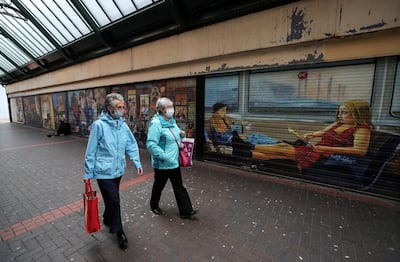Britain's finance minister Rishi Sunak expanded his new job support scheme to help businesses required to close amid heightened restrictions on Friday, as cases in the country escalate "out of control".
Under Mr Sunak’s plans, the government will pay two-thirds of the wages of employees in companies affected by the new measures, which could see bars and restaurants shut in areas of the UK where the disease is spreading.
“The expansion of the Job Support Scheme will provide a safety net for businesses across the UK who are required to temporarily close their doors, giving them the right support at the right time,” said Mr Sunak in a statement on Friday.
The resurgence of coronavirus in recent weeks is forcing the government to redraw limits on social activity, even as it tries to keep as much of the economy open as possible to limit job losses. It’s a balancing act that’s becoming ever more difficult, with Public Health England warning the country faces a “definite and sustained” rise in infections.
Skills minister Gillian Keegan said the country faced an “unbelievably serious situation” as the virus was “getting out of control”.
Under the government’s new scheme, set to roll out on November 1, the government will pay up to £2,100 ($2,720) a month to cover the wages of employees that cannot work. Employers will not be required to contribute towards wages but will have to cover National Insurance and pension contributions.
Mr Sunak said cash grants for businesses required to close will also be increased to up to £3,000 per month.
Businesses will only be eligible to claim the grant while they are subject to any restrictions and employees must be off work for a minimum of seven consecutive days. However, businesses whose staff were off work before November 1 due to localised restrictions can also apply, according to HM Treasury.
Available for six months, the scheme will be reviewed in January.

It is a change of policy for Mr Sunak, who responded to calls from businesses, local leaders and unions to provide a financial support package to prevent mass job losses in sectors that will be subject to new restrictions.
“The steep rise in infections in some areas means new restrictions to curb numbers feel unavoidable," said Dame Carolyn Fairbairn, director general of the Confederation of British Industry.
“The chancellor’s more generous job support for those under strict restrictions should cushion the blow for the most affected and keep more people in work."
The government’s furlough scheme is set to expire at the end of this month. At the height of that programme, the government paid 80 per cent of the salaries of furloughed workers, keeping a lid on unemployment.
That is being succeeded by the narrower Jobs Support Scheme, which will see the government pay up to 22 per cent of wages for workers who return to work from their furlough from November 1.
Adam Marshall, director general of the British Chambers of Commerce, said more generous cash grants would “be of some help” to businesses, but would not be enough to ward off a “sustained cash crunch”.
“As welcome as this new support will be for companies shut down by government decree, additional local restrictions and lockdowns will have a material impact on many other firms, especially in supply chains and in town and city centres. Their cash flow concerns, and worries about future demand, must be heeded,” Mr Marshall said.
Meanwhile, the British Independent Retailers Association urged Mr Sunak not to forget the retail sector as high street visitors declined last month.
"Whilst it is right to support the hospitality sector, the Government also needs to remember that the fragile retail sector is also affected by any new restrictions and requires ongoing support if these businesses are to survive a very hard winter period,” said Andrew Goodacre, chief executive of Bira.
Britain's V-shaped recovery from the crisis faltered in August, as the economy grew much slower than expected, leading Mr Sunak to acknowledge people were "worried" ahead of the winter months.
Gross domestic product rose just 2.1 per cent from July, far lower than economist forecasts of 4.6 per cent, according to data from the Office for National Statistics.

